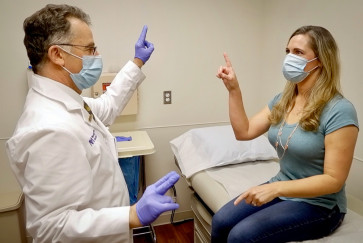On Super Bowl Sunday, many tuning into the big game saw a controversial ad from the telehealth company Hims & Hers. The minute-long spot begins by skewering the American healthcare system, saying it’s “designed to keep us sick and stuck” while profiting off of America’s obesity epidemic. It then launches into promotion of the company’s compounded weight-loss medications.
Prior to the game, a pharmaceutical trade group and government officials complained about the ad’s potential to mislead consumers about the safety and side effect information of the drugs. Still, the ad ran unaltered.
The backlash to the ad speaks to the complicated nature of weight loss in America today, according to Northwestern University obesity experts Drs. Justin Ryder and Veronica Johnson.
“Yes, these drugs provide some level of risk, but I think this speaks to the desperation and larger insurance-coverage issues,” said Ryder, associate professor of surgery and pediatrics at Northwestern University Feinberg School of Medicine and vice chair of research for the department of surgery at Ann & Robert H. Lurie Children's Hospital. “These companies are preying on you, but we live in a capitalistic society.”
Why people take compounded weight loss drugs
Ryder said the compounded versions of these drugs are appealing to people who need and want to lose weight but whose insurance won’t cover the FDA-approved versions of GLP-1-based medications like semaglutide or tirzepetide. (The FDA does not approve compounded drugs.)
“They’re offering them to people at rates that are high but still less than the full price of the FDA-approved versions,” Ryder said.
An end in sight?
The argument over compounded versions of GLP-1-based medications might soon become a moot point, Johnson said.
“Neither of these may be available options as compounded medications are only recommended in these situations upon a supply shortage,” said Johnson, assistant professor of general internal medicine at Feinberg and a Northwestern Medicine physician. “Tirzepetide is no longer on the FDA drug-shortage list. Semaglutide is likely coming off soon.”
Understanding the risks
Ryder’s and Johnson’s biggest concern with the compounded versions of the GLP-1–based medications are impurities and bacteria, they said.
“These drugs are not coming from a regulated manufacturer, so you don’t know who the manufacturer is, and the level of scrutiny in terms of practices compared to places that produce the FDA-approved medications is markedly different,” Ryder said. “For instance, Eli Lilly and Novo Nordisk would immediately get shut down if there were impurities.”
The risks include side effects and long-term complications, Ryder said.
“We don’t have any idea of potency and efficacy of these drugs,” Johnson said. “We also don’t have any safety data. There are some reports that these may be marketed and not even been the advertised products.”
Listen to a podcast with Ryder to learn more about GLP-1-based medications.


